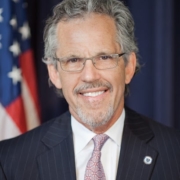Controversies over school policies that impact transgender students have increasingly made headlines in the United States for the past few years. What legal protections do transgender students have in schools? And how have the Obama and Trump administrations interpreted the law in this regard?
My guest today is Suzanne Eckes, professor in the Educational Leadership and Policy Studies Department at Indiana University. She has written about the various legal cases involving transgender students.
Citation: Eckes, Suzanne, interview with Will Brehm, FreshEd, 177, podcast audio, October 21, 2019. https://www.freshedpodcast.com/suzanneeckes/
Transcripts, Translation, and Resources:
Will Brehm 1:46
Suzanne Eckes, welcome to FreshEd.
Suzanne Eckes 1:48
Thank you so much for the invitation. I’m looking forward to our conversation.
Will Brehm 1:53
So, what do we know about the lived experiences of transgender students in educational institutions today?
Suzanne Eckes 2:00
Well, we have a lot of research that is out there both in social sciences – there’s legal research, and what we know is LGBTQ students, generally and more specifically, transgender students – experience discrimination, harassment and bullying at really alarming rates in schools. And to illustrate, some researchers have reported various findings related to the high rates of harassment – the American Psychological Association and others – and the negative effects that this, in fact, has on their emotional and academic well-being. And there are studies also that have found that transgender students have higher rates of suicide: the American Association of Suicidology; researchers such as Grossman, Park and Russell or Russell, Pollitt, Li and Grossman; and this occurs especially in those schools with climates that are considered less inclusive. A few researchers have observed, in fact, that over one quarter of those transgender students that they interviewed reported making a suicide attempt, and this is by Grossman and D’Augelli – a 2007 study. So, you know, to answer your question, the lived experiences for some transgender students in some parts of the country, according to this earlier research, shows that it can be a very challenging time in schools.
Will Brehm 3:35
And so, what laws even begin to protect or cover transgender students?
Suzanne Eckes 3:42
So, when you review the litigation involving transgender students, especially in the K-12 arena when it comes to access issues in schools, you often see a Title IX claim, and also you see an Equal Protection Clause claim. So, Title IX of the Education Amendments of 1972 prohibits discrimination based on sex in those educational institutions that receive federal funds. And the Equal Protection Clause of the 14th Amendment from our US Constitution states that, “No state shall” (and I’m paraphrasing here) “deny, to any person within its jurisdiction, the equal protection of the laws.” So how that’s translated is maybe the Equal Protection Clause would require that similarly situated people be treated similarly or be treated the same. Those are two of the legal claims that you see in the litigation. And I would just like to point out the guidance from our US Department of Education, specifically as it focuses on Title IX. So, your listeners may or may not be aware that in 2014, there was a letter that came out of the US Department of Education from the Assistant Secretary for Civil Rights, and it clarified that transgender students were protected from sex based discrimination under Title IX. This was based on the Department of Ed’s interpretation at that time. And then in January 2015, an important letter from the Office for Civil Rights again interpreted how Title IX’s implementing regulations apply to transgender students. And what they found was that school officials must not discriminate against transgender students when it comes to restroom and locker room access policies. That’s where a lot of the controversies around were these access issues to facilities. In May 2016, the US Department of Justice and the US Department of Education issued a really important “Dear Colleague” letter that gave guidance to schools, and this Dear Colleague letter highlighted that school districts have a responsibility to provide equal access to transgender students. And the Department at that time – the Education Department in 2016 – interpreted Title IX’s regulations, so there’s the Title IX law, and they’re implementing regulations. Well, the Title IX’s implementing the regulations, they interpreted it to mean that schools can assign restrooms based on sex. According to the regulations, you can assign restrooms based on sex. But they noted that the Title IX regulation does not really address whether schools can exclude transgender students with restrooms that align with their gender identity. So specifically, because the regulation is silent on this matter, the Department of Ed at that time offered its interpretation, which requires schools to treat transgender students in a way that’s consistent with their gender identity. The guidance specifically stated, “The desire to accommodate others’ discomfort cannot justify a policy that singles out and disadvantages particular classes of students”. So, I should note that Dear Colleague letter and the guidance that I just referred to does not have the force of law. But guidance is issued all the time from the US Department of Education, whether it’s through the Obama administration or during the Trump administration, and school leaders certainly look to these guidance documents for assistance when trying to interpret the law. So, they’re helpful, they’re important, but they don’t have the force of law. And, you know, consistent with the guidance at that time – and this was under the Obama administration; I noted that this was 2014, 2015, 2016, where we saw a lot of activity in this area – that I also see that most transgender students in legal arguments, that they argue that their sex is determined with reference to their gender identity. You know and at least one federal court observed, actually it’s more, but here’s a quote from one federal court, observed “that gender identity is akin to sex because it is deeply ingrained and inherent in the students’ very beings”. So that is, kind of in a nutshell, some of the legal claims Title IX Equal Protection Clause, and then some of the interpretation issues under the Obama administration, and if you’re interested, I can can tell you about some of the recent changes.
Will Brehm 8:02
Yes, before we do that, let’s talk a little bit more about some of this guidance. So you use the term a “Dear Colleague” letter. Could you explain what that is for me, who doesn’t really know much about education law?
Suzanne Eckes 8:15
Yes. So, I’ll speak to it within the context of education. So, oftentimes the US Department of Education will put out guidance, oftentimes it’s referred to as a Dear Colleague letter, on a variety of issues that the Department of Education would oversee. So, you might see a Dear Colleague letter related to Title IX as it pertains to athletics. You might see a Dear Colleague letter that gives you guidance, maybe from a different agency, related to Special Ed related matters. So the point behind it is to provide clarity to the existing case law, usually. So, we have, oftentimes, a series of cases, and maybe those cases aren’t the easiest for a school official to decipher and interpret. So these guidance documents, which are presumably sent to schools, kind of take the whole body of case law and explain what this means, and how you should maybe think about your school policies based on this guidance and their interpretation. And make no mistakes, currently different administrations interpret the case law differently. And I’m thinking of affirmative action. The Obama administration interpreted that differently than maybe the Trump administration does. Well, the same holds true for this issue with access, and transgender students and Title IX.
Will Brehm 9:51
Okay, so you have these laws – Title IX, Equal Protection Clause, the 14th Amendment – and then these get sort of interpreted by different administrations, which is their prerogative to guide school officials to make particular decisions in line with their interpretation of these laws. So a lot of this for transgender access, for transgender students, at least in the news, has focused on restrooms. Has there been other areas for schools when we talk about access for transgender students that has come under this guidance?
Suzanne Eckes 10:24
Yes. I mean, there certainly have been issues related to locker rooms. And you might consider this under the umbrella of access, but there has been controversy about which pronouns to use with a transgender student. So, if a student was assigned a sex at birth as male and later identifies as female, and asks the administration and teachers that, “I no longer want to be referred to as Michael. I would like to now be referred to as Michelle and, I would like you to use “she” and “her”. And then teachers, maybe in some parts of the country, we’ve seen refused to do so based on their religious beliefs are different. You know, there’s been some different issues, but the main issue has been restroom access and locker room access.
Will Brehm 11:20
And so, you know, under the Obama guidance from 2014 to 2016, for instance, do we know how widely adopted some of this guidance was when it came to transgender access inside schools?
Suzanne Eckes 11:33
You know, I don’t have any exact data on how widespread school districts implemented that guidance. Make no mistake, there were certainly school districts that bought that guidance and that interpretation of Title IX, but interestingly, since the guidance from the Obama administration, there has been some litigation in this area that even clarifies for all of us a little bit more, in certain circuits, the legal rights of transgender students. So, there are at least 10 cases involving transgender students and access issues that either were examined at federal court level or in a state court. I’m not talking about civil rights complaints; there’s another line of those types of complaints as well. But just speaking about the litigation in federal and state court, there have been 10 access cases involving K-12 students. I’m not talking about higher education; but the ones that I study are K-12. And in all 10 of those cases, they’ve ended in a favorable result for the transgender student. So, you know, I don’t know if you want me to speak a little bit what’s happened with the new administration and their interpretation of Title IX and the fact that they’ve rescinded the guidance from the Obama administration.
Will Brehm 12:59
Yes. So, these favorable results, could you give an example of just, perhaps, one before we turn to what’s happening since 2016, and in the guidance offered by the Trump administration?
Suzanne Eckes 13:10
Sure. So, I’m situated in the Seventh Circuit Court of Appeals. I live in Indiana, so I’ll speak to a Seventh Circuit case. So, we’ve had a couple Circuit Court of Appeals cases. And so within this Seventh Circuit Appellate Court, so that’s not a federal district court, but it was appeal to the Seventh Circuit Court of Appeals, upheld the district court’s decision to grant a transgender student’s Motion for Preliminary Injunction – this was in 2017. And one thing that I find interesting is where the court posited that a policy that requires an individual to use a bathroom that does not conform with his or her gender identity, punishes that individual for his or her gender non-conformance, which in turn violates Title IX. “Providing a gender-neutral alternative is not sufficient to relieve the school district from liability as it is the policy itself which violates the Act.” That’s from the Whitaker Decision 2017, it’s Whitaker v. Kenosha Unified School District, No. 1 Board of Eduction. It came out of Wisconsin. And I should note that after that proceeding, it was a preliminary injunction motion, but after that proceeding, the school district settled with Whitaker, the transgender student, for $800,000. So that’s one example of the 10 cases involving access issues. Now, I did point out that this was a motion for preliminary injunction, and not all of them involve some of them.
Will Brehm 14:44
So, what is a preliminary injunction?
Suzanne Eckes 14:46
Oh, that’s a great question. So a court might grant a request for preliminary injunction if the facts demonstrate that there will be irreparable harm or for example, that the loss that will result before a full judgment on the merits before – you know, there’s a full trial on the merits – takes place. So the usual role of preliminary injunction is to help preserve the status quo pending outcome of the litigation. But I should point out that the judge at this point in time is also deciding whether there is a reasonable probability that the plaintiffs will prevail on the merits. And oftentimes, you find that the judge’s reaction to a preliminary injunction provides helpful insight into the entirety of the litigation. So when you’re seeking a preliminary injunction, the plaintiff must demonstrate that there’s a likelihood of success on the merits, that there’s a likelihood of suffering irreparable harm without preliminary relief, that the balance of equities would favor the plaintiff receiving this type of relief, and that the injunction is in the public interest. So the Whitaker case that I just discussed from the Seventh Circuit, at least my interpretation of that case, the ruling was pretty strong. In my opinion, and I’m sure others would disagree with me, the writing was on the wall for Kenosha School District. And perhaps that may explain why they settled with Mr. Whitaker for $800,000.
Will Brehm 16:13
Right. Okay, so favorable outcomes for at least these 10 cases that you’ve been studying. So, Betsy DeVos gets in in 2017 after Trump’s election. How does the interpretation of transgender rights inside schools change?
Suzanne Eckes 16:35
So, things have really changed with the new administration with regard to the interpretation from the US Department of Education. So, I should note that in, I think it was February 2018, the US Department of Education announced that it will no longer investigate civil rights complaints from transgender students. So that was something new. You know who are barred from using restrooms that match their gender identity in schools. Typically, the Department of Education’s Office for Civil Rights accepts complaints that alleged civil rights violations, and then they enforce these decisions. And under the previous administration, the Office for Civil Rights, you know as I mentioned before, found that prohibiting students from using the restroom that aligned with their gender identity was a form of sex discrimination under Title IX. So, the current administration doesn’t agree with that approach, that Title IX provides protections for transgender students, for specifically focused on restrooms. So, the new approach is to not investigate these civil rights complaints, which I would argue, would likely leave transgender students more vulnerable in school. And it’s really inconsistent with related court decisions. I said there are 10 court decisions, and I will point out to be fair that not every jurisdiction has examined transgender access issue at the K-12. level. We have federal district courts in Maryland and Pennsylvania, and I mentioned the Seventh Circuit. There are some related cases in the Third Circuit that I’m happy to speak to, related to privacy rights. But, it kind of leaves these transgender students, I would argue, more vulnerable, especially if you’re in a jurisdiction that doesn’t have a court decision that you could rely upon. So, you know, it was interesting, after the current administration rescinded the previous administration’s guidance on this topic, the former head of the Office for Civil Rights called the current Department’s approach appalling. I think it was “appalling and deeply dangerous”.
Will Brehm 18:33
Wow. Yes, I mean and at this sort of the guidance level, the interpretation of the law, as we said earlier, which is sort of the prerogative of whatever administration is in power. At the school level, have we seen changes? Have schools that used to have bathrooms for transgender students, or you know, set the bathrooms up in a particular way based on gender identity rather than sex, have schools switched back?
Suzanne Eckes 19:02
You know I can only speak from my own experience. So, I live … the Seventh Circuit opinion would apply to the state that I currently reside in. And based on that Seventh Circuit opinion, I’ve certainly seen school districts move in the direction. And, you know, many of them did before, because of the guidance that came out of the earlier administration, but moving in that direction, that they have the Whitaker decision now, and actually, there was a even more recent federal district court case in Indiana that also found in favor of the transgender student. So certainly, in my state, I work with a lot of principals and superintendents. I’m sure not all of them do this, but they’re aware of those decisions and are moving in the right direction to follow court precedent, which is to allow students to use restrooms that align with their gender identity. And in addition to these 10 access cases, I should point out too, there are at least three that I found, probably more but three very interesting cases involving transgender students and privacy. But in these cases, it wasn’t the transgender student initiating the litigation, it was cisgender students at the school, their parents who said, “I’m not comfortable sharing a restroom with a transgender student so I’m going to initiate this lawsuit, make claim a privacy violation.” And in all three of those decisions that I’m aware of, so one Third Circuit Court of Appeals, which is a pretty big deal, but then there’s also a federal district court from Illinois, that decision, and a federal district court from Oregon, I think. The Third Circuit case was a pretty, I thought, forceful argument, siding you with the transgender students and against the cisgender students. The court observed, “we declined to recognize such an expansive constitutional right to privacy, a right that would be violated by the presence of students who do not share the same birth sex. Moreover, no court has ever done so.” So again, this is just the Third Circuit Court of Appeals, and of course, another court could decide in another way. But interestingly, in October 2019, we have 10 cases that had favorable results for transgender students when they initiated the lawsuits. And then we have three privacy cases initiated by cisgender students, and it did not end in a favorable result for those cisgender students. So, do we call this a trend? Is 13 cases a trend? Maybe some would argue that, but it remains to be seen there are plenty of circuits that haven’t examined or analyzed this issue fully yet.
Will Brehm 21:50
And so, at what point does, and maybe this is impossible to answer, but it just makes me think … so there’s all these legal cases that are going through the courts, and like you said, 13 cases that you know, basically all have ruled in support of greater access to transgender students and not necessarily having sweeping notions of privacy that would prohibit or discriminate against transgender students. At what point do these laws have to be followed by US State Department of Education guidance notes?
Suzanne Eckes 22:24
Yes, it’s interesting that we don’t have a US Supreme Court decision yet. So generally, when you read the guidance documents, and you know a variety of education law-related issues, oftentimes those guidance documents come out after a significant Supreme Court decision, or a series of Supreme Court decisions that would give us a little bit more information on a given legal topic. So, you know, that kind of remains to be seen right now. I do find it interesting that we do have these 13 cases. The current administration has not reversed course, it’s still rescinded that guidance. They’re not doing the investigations that took place during the last administration. And I don’t anticipate that changing anytime soon.
Will Brehm 23:16
One of the critiques, I think, from more a liberal or progressive side in America is there’s this outrage of the Trump administration on all different policy initiatives and maybe legal challenges that they initiate. But there then seems to be this sort of like “there’s nothing we can do about it”. Right? There’s always this sort of like “Well, what can we do if we don’t agree” the way in which this interpretation is being laid out by say, Betsy DeVos? So, what can be done inside schools? Is it just we have to wait for the Supreme Court to make a ruling? Is there things that people can do, that school districts can do, that perhaps you know, I do not know, future administrations can do?
Suzanne Eckes 24:02
Yes, that’s a great question. And certainly, at the local level, school districts can follow the 13 cases that are out there and make inclusive policies for all students, including transgender students and make the right decision to take that approach. Also, at the state level, there are currently, last time I looked, 20 states and the District of Columbia that provide protections based on sexual orientation and gender identity in places of public accommodation. So, you’ve seen throughout the country, different state legislatures review the idea of providing protections at the state level to have these types of nondiscrimination policies that allow transgender students used restrooms of their choice, and it continues to grow. So that’s hopeful. So, that’s something at the local level: I think, parents can get elected to school boards. You don’t have to be on the school board, but it would certainly help to influence policy with regard to transgender access at the state level. We can try to influence our legislators. Also, at the state level … I focused on the 10 cases that have been heard at the state level or in federal courts, but there also are civil rights complaints that can be filed. There was a civil rights complaint that was pretty high profile in Colorado that also found in favor of transgender student. So, then there would be guidance if these state laws, or these civil rights commissions, are examining this issue. That could help school districts. You know, even if you have a school leader who really believes that we should adopt inclusive policies because it’s in the best interest of the child to have something to fall back on, to support the argument that the school leader is making, the school board is making. “Look, we have this litigation. We also have a state law”, as kind of pushback to parents who may challenge the school policies as they are proposed.
Will Brehm 26:08
Well, it’s a very fascinating area to be looking out for in terms of education in law, but how it does impact the everyday experiences of children and parents and teachers inside school. So, Susanna Eckes, thank you so much for joining FreshEd. Really a pleasure to talk today, and I’m going to keep following what you put out because this is a really fascinating topic.
Suzanne Eckes 26:28
Thank you, thank you so much. I’ve really enjoyed speaking with you today.
Transgender Students and Education Law










